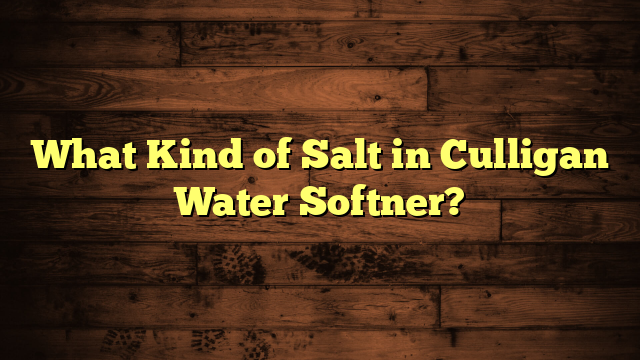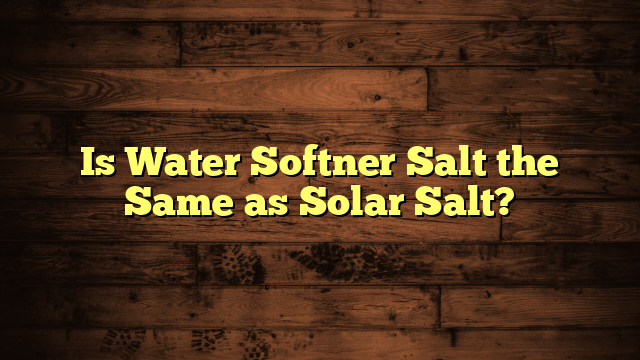What Kind of Salt in Culligan Water Softner?
Did you know that about 85% of homes in the U.S. deal with hard water issues? If you're considering a Culligan water softener, the type of salt you use can greatly impact its efficiency and longevity. While sodium chloride is the most common option, there are alternatives like potassium chloride that might suit your health needs better. So, what factors should you consider when choosing the right salt for your system? Understanding these details can make a difference in both your water quality and softener performance.
Key Takeaways
- Culligan water softeners primarily use sodium chloride, which is effective and affordable for most users.
- Options for sodium chloride include solar salt, rock salt, evaporated salt, and pellet salt, each with varying purity levels.
- Potassium chloride is an alternative for those on low-sodium diets, providing essential potassium while softening water.
- High-purity salts minimize impurities, reducing clogging and improving softener efficiency and lifespan.
- Choosing the right type of salt depends on health needs, cost, availability, and water hardness conditions.
Importance of Using the Right Salt
Using the right salt in your Culligan water softener is vital for peak performance and longevity. The salt quality you choose directly impacts how effectively your softener operates. High-quality salt minimizes impurities, which can lead to clogs and damage over time.
If you opt for low-grade options, you might find yourself facing frequent maintenance issues that can shorten your softener lifespan. When you use premium salt, it dissolves more efficiently, providing a consistent regeneration cycle.
This consistency guarantees that the resin beads in your softener can effectively remove hardness minerals, allowing for ideal water quality. Conversely, poor salt quality can lead to a buildup of residue in the brine tank and on the resin beads, ultimately reducing the softener's efficiency and increasing wear and tear.
Moreover, using the right salt helps maintain the balance of your water softening system. You're not just prolonging the life of your softener; you're also making certain that your home's water supply remains soft and free of unwanted minerals.
To summarize, selecting high-quality salt is vital for maximizing your Culligan water softener's performance and longevity.
Types of Salt for Water Softeners
When choosing salt for your Culligan water softener, you'll encounter primarily sodium chloride and potassium chloride options.
Sodium chloride is the most common choice, known for its effectiveness and affordability.
On the other hand, potassium chloride offers added health benefits and is a suitable alternative for those looking to reduce sodium intake.
Sodium Chloride Options
A variety of sodium chloride options are available for water softeners, each tailored to specific needs and preferences. Understanding these sodium chloride types can greatly impact your softener performance. Here's a quick overview of the most common types you might consider:
| Sodium Chloride Type | Purity Level | Recommended Use |
|---|---|---|
| Solar Salt | 99% | General softening |
| Rock Salt | 95% | Cost-effective option |
| Evaporated Salt | 99.5% | High-efficiency systems |
| Pellet Salt | 99.5% | Easy to handle |
Choosing the right sodium chloride type is crucial for maintaining ideal softener performance. For example, evaporated salt tends to dissolve more quickly and efficiently, making it perfect for high-demand households. On the other hand, rock salt is often more economical but may contain impurities that can affect your system's efficiency. By selecting the appropriate sodium chloride option, you can guarantee your water softener runs smoothly and effectively, providing you with soft water tailored to your specific needs.
Potassium Chloride Benefits
For those seeking an alternative to sodium chloride in their water softeners, potassium chloride offers several notable benefits. One significant advantage is its lower sodium content, making it a preferable choice for individuals with health considerations, such as hypertension or those on a low-sodium diet. By using potassium chloride, you can soften your water without adding excess sodium to your diet, which is essential for maintaining ideal health.
Additionally, potassium chloride is effective in ion exchange processes, helping to reduce hardness while providing essential potassium, an important nutrient for plant growth. This aspect makes it an excellent option if you use softened water for irrigation or in aquariums, as it supports healthy plant and aquatic life.
Moreover, potassium chloride is less corrosive than sodium chloride, which can enhance the longevity of your plumbing fixtures and appliances.
To summarize, potassium chloride benefits include reduced sodium intake, nutrient supplementation, and decreased corrosion, making it a viable alternative for water softening. If you're concerned about your health and the environment, potassium chloride could be the solution you need for efficient water conditioning.
Rock Salt: Pros and Cons
When considering rock salt for your Culligan water softener, you'll find it to be a cost-effective option compared to other types of salt.
However, its purity can vary, and it may contain additives that could impact performance.
You'll want to weigh its efficiency in softening water against these factors to make an informed choice.
Cost-Effective Option
Taking into account cost-effectiveness, rock salt emerges as a popular choice for water softeners. If you're mindful of budget considerations, using rock salt can offer significant cost savings over other types of salt.
Here are some key pros and cons to evaluate:
- Affordability: Rock salt is typically less expensive than solar or evaporated salts.
- Availability: You can find rock salt at most local hardware stores or online, ensuring easy access.
- Ease of use: It's straightforward to load into your softener, requiring minimal effort.
- Sufficient hardness removal: Rock salt effectively softens water, providing the necessary sodium for peak performance.
- Lower maintenance costs: Since rock salt is less expensive, you'll spend less over time on your water softening needs.
However, keep in mind that while rock salt may be budget-friendly, it mightn't always provide the same level of purity as more refined options.
It's important to weigh these factors against your specific needs to determine if rock salt aligns with your expectations for performance and longevity in your water softening system.
Purity and Additives
Purity is an essential factor to evaluate when selecting rock salt for your water softener. Higher salt purity guarantees better efficiency in the softening process, as impurities can lead to clogging and reduced performance. When considering rock salt, you'll also want to weigh the additive considerations that come with different types of salt.
Here's a quick comparison to help you decide:
| Aspect | Rock Salt |
|---|---|
| Salt Purity | Often lower (85-95%) |
| Additives | May contain impurities |
| Cost | Generally cheaper |
While rock salt is cost-effective, its lower salt purity might introduce impurities that can affect your water quality. Additives found in some rock salt products can further complicate the situation, as they may not be suitable for all water softening systems.
Before choosing rock salt, consider how these factors impact your water softener's efficiency and your water's overall quality. By being informed about salt purity and additive considerations, you can make a better choice for your home.
Efficiency in Softening
While rock salt can be a cost-effective option for water softening, its efficiency can vary significantly based on several factors. Understanding these factors helps you make informed choices during the softening process.
Here are some pros and cons of using rock salt compared to other salt types:
- Cost-Effective: Rock salt is generally cheaper than other salts, making it a budget-friendly choice.
- Impurities: It often contains impurities that can hinder the softening process, potentially leading to buildup in your system.
- Dissolution Rate: Rock salt dissolves slower than other types, which can affect the regeneration cycles of your water softener.
- Clogging Potential: Its larger granules may cause clogs in the brine tank, impacting overall efficiency.
- Efficiency Variability: Depending on water hardness and other conditions, the effectiveness of rock salt can fluctuate.
Solar Salt: Benefits and Drawbacks
When you're choosing a salt type for your Culligan water softener, solar salt presents both advantages and disadvantages worth considering.
One of the notable solar salt benefits is its cost-effectiveness. Typically, solar salt is less expensive than evaporated salt, making it a budget-friendly option for homeowners. Furthermore, solar salt is widely available, often found at local retailers, which adds convenience to your purchasing process.
However, there are some solar salt drawbacks to keep in mind. One significant concern is its purity level. Solar salt can contain impurities and insoluble matter, which might lead to clogging in your softener system over time. This can reduce efficiency and necessitate more maintenance.
In addition, while solar salt works well in most conditions, it may not perform as effectively in extremely hard water areas compared to higher-purity salts.
Evaporated Salt: Features and Usage
Evaporated salt is often considered the gold standard for water softening due to its higher purity and consistent quality. When you choose evaporated salt for your Culligan water softener, you're opting for a product that offers numerous advantages, thanks to its meticulous production process. This method involves evaporating seawater or brine, resulting in a refined product that contains minimal impurities.
Here are some key benefits of using evaporated salt:
- Higher Purity: Contains minimal contaminants compared to other salt types.
- Consistent Quality: Each batch remains uniform, guaranteeing reliable performance.
- Efficient Softening: Works effectively to exchange calcium and magnesium ions.
- Less Clogging: Reduces the risk of buildup in your softener system.
- Longevity: Usually lasts longer between refills due to its efficiency.
Incorporating evaporated salt into your water softening regimen enhances the overall effectiveness of the system.
Its production method guarantees that you're getting a product designed specifically for peak water treatment, making it a preferred choice among many homeowners seeking the best results in their water quality.
Potassium Chloride as an Alternative
If you're exploring alternatives to evaporated salt for your Culligan water softener, potassium chloride is a viable option worth considering. This compound not only softens your water but also offers several potassium chloride benefits that make it an attractive choice.
One significant advantage is that potassium chloride is a more environmentally friendly option compared to traditional sodium-based salts. It minimizes sodium discharge into the environment, which can be beneficial for those on sodium-restricted diets.
In a potassium chloride comparison with evaporated salt, you'll find that while both effectively reduce hardness, potassium chloride can provide additional health benefits. For instance, it can contribute to your dietary potassium intake, an essential nutrient for maintaining proper bodily functions.
However, keep in mind that potassium chloride may be slightly more expensive and less readily available than evaporated salt.
It's also important to note that some users experience variations in regenerating efficiency and taste when using potassium chloride. As a result, consider your specific needs and preferences when deciding between these two options.
Ultimately, potassium chloride is a worthy alternative that aligns well with eco-friendliness and health consciousness.
How to Choose the Best Salt
Choosing the right salt for your Culligan water softener is essential for peak performance and efficiency.
When selecting the best salt, consider these key salt selection criteria to guarantee superior water quality impact:
- Purity: Look for high-purity salt to minimize impurities that can clog your system.
- Type: Decide between sodium chloride or potassium chloride, based on your preferences and health considerations.
- Grain Size: Choose a salt grain size that fits your softener—larger grains dissolve more slowly, while smaller grains dissolve quicker.
- Water Softener Compatibility: Check if the salt is specifically designed for your model; not all salts work for every softener.
- Price and Availability: Balance cost with quality; sometimes, cheaper options may lead to higher maintenance costs.
Tips for Maintaining Your Softener
Maintaining your Culligan water softener is vital for guaranteeing its longevity and peak performance. Regular maintenance not only enhances efficiency but also prevents costly repairs.
Begin by checking the salt levels in the brine tank weekly. Aim to keep the salt at least half-full to optimize regeneration cycles. When adding salt, consider using high-purity salt pellets to minimize impurities that can clog the system.
Implementing smart salt storage solutions is important. Store your salt in a cool, dry place to prevent clumping and moisture absorption. It's also wise to avoid overfilling the brine tank, as this can lead to salt bridges, which obstruct the flow of water and reduce effectiveness.
Another key softener maintenance tip is to schedule annual professional inspections. A technician can assess the system's performance, check for leaks, and confirm all components function correctly.
Furthermore, clean the resin tank and brine tank periodically to remove buildup and improve efficiency.
Frequently Asked Questions
Can I Use Table Salt in My Culligan Water Softener?
You shouldn't use table salt in your Culligan water softener; it can damage the system. Instead, consider table salt alternatives like potassium chloride. Proper water softener maintenance guarantees efficiency and prolongs the lifespan of your unit.
How Often Should I Add Salt to My Water Softener?
You might wonder how often to add salt for ideal water softener efficiency. Generally, check your salt levels monthly and refill as needed. Consistent salt maintenance guarantees your system runs smoothly and effectively softens your water.
Is It Safe to Mix Different Salt Types?
Mixing salt types isn't recommended, as it can affect your water softener's efficiency. Different salts have varying purities and additives, which might lead to buildup or malfunction. Stick to one salt type for ideal performance.
What Happens if I Run Out of Salt?
Imagine your water softener as a ship at sea; without salt, it stalls. Regular maintenance's essential, so when you run out, consider salt alternatives to prevent hard water troubles and keep your vessel sailing smoothly.
Where Can I Purchase Salt for My Water Softener?
You can purchase salt for your water softener at local retailers like hardware stores or supermarkets. Moreover, online stores offer convenient options, allowing you to compare prices and find the best deals easily.
Conclusion
In summary, selecting the right salt for your Culligan water softener is as essential as finding the right key for a lock. Whether you opt for high-purity sodium chloride or potassium chloride, understanding your water's needs and your health considerations will guide your choice. Regular maintenance and monitoring guarantee your softener operates efficiently, prolonging its lifespan and enhancing your water quality. By making informed decisions, you can enjoy the benefits of soft water tailored to your specific requirements.







